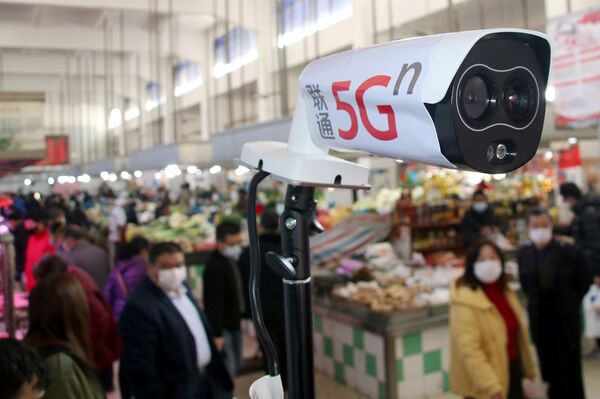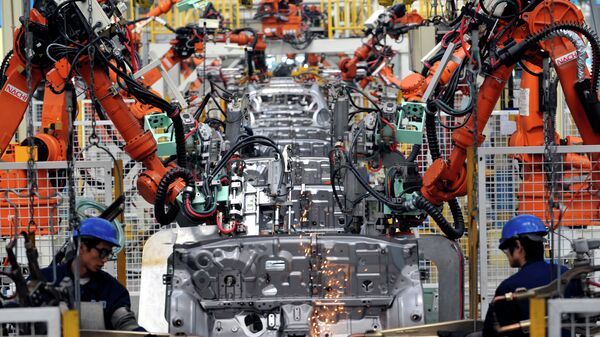Asian, European and American indices are going down with the Shanghai Composite dropping 0.83%, Japan's Nikkei 225 plummeting 0.79%, Germany's DAX falling 1.2% and the US Dow Industrials sliding as much as 879 points, or about 3.2%, on Wednesday.
Nevertheless, in his Tuesday op-ed for the Asia Times American economist David P. Goldman emphasised "Asia's surprising resilience in a world market crash" suggesting that Asian countries "might be better equipped to deal with a pandemic".
Return to Normal Life in China Will Take Time
According to Thomas W. Pauken II, a Beijing-based political commentator on Asia-Pacific issues and the author of the US vs China: From Trade War to Reciprocal Deal, suggests that "the Asian markets are resilient and can rebound from the coronavirus since many Asians are savers, not big spenders".
Nevertheless, China is facing an "inevitable downturn", he remarks. Citing China's Caijing magazine, Reuters suggested in late January that in the first quarter of 2020 China's GDP may drop to 5% or even lower. For their part, Western economists predicted China's full-year GDP growth at 5.8% or 5.5% for now.
"Wuhan remains under lockdown, while many shops and restaurants have been shut down for several weeks", Pauken says, describing the situation on the ground. "Small business owners, family-owned shops will get hit the hardest, and we will see a huge wave of bankruptcies ensuing in many Chinese cities. The job losses will result in many Chinese choosing not to return to the big cities, but they may go back to their rural hometowns where business expenses are lower to start life all over and start anew again".
At the same time, some China's industrial giants such as Yanfeng Adient Seating Co and Siemens Healthineers located in Shanghai are returning to full production "guaranteeing the safety of employees amid the coronavirus epidemic", according to Shine, an East Chinese English-language media outlet.
Factories in Shanghai are returning to full production while guaranteeing the safety of employees amid the #coronavirus epidemic. https://t.co/ikiKrpW1e8 pic.twitter.com/agyRPNMHKk
— SHINE (@shanghaidaily) February 25, 2020
"Shanghai is returning to normal except for schools", Pauken says. "Shanghai is the financial hub for the country and a trendsetter. The city can act more quickly because they have the most incentives to go back to work. Chinese companies will follow Shanghai's lead, but it will still take time for a return of normal economic activities nationwide".
However, the Beijing-based author admits that the return to normal would be gradual and could take longer than expected: "To be realistic, we will not see a return to full normalcy until this summer, June", he foresees. "To return to 5 to 6 per cent annual GDP (gross domestic product) growth rates for China, well that will take 2-3 years to return, and that's being optimistic".

Coronavirus Disrupting Global Supply Chains
The future of global markets remains uncertain, as the number of those contracting the virus is growing day by day. Global investors are becoming increasingly concerned about how the disease could affect manufacturing supply chains around the world, especially given that the epicentre of the outbreak is located in China also known as "the world's factory".
Thus, Toyota signalled Wednesday that operations at its 16 vehicle and components sites in Japan could be severely affected by supply chain problems due to the coronavirus explosion, according to CNBC. For its part, Bloomberg warned that "the carnage will be substantial and indiscriminate" hitting "giants like Apple" and "may prove particularly brutal to Amazon, which relies heavily on products from third-party merchants".
"The COVID-19 outbreak has just exposed a major weakness of globalism", says Pauken. "Localising is the belief that you should keep supply chains, manufacturing and consumption in a domestic market. Hence, localising would prevent a country from facing serious disruptions if other countries can't trade and invest with them. China is the world's largest manufacturer and exporter, and when the country can't meet production goals that will destabilise many countries that rely on its cheaper imports and labour services".
The commentator suggests that "globalism can't succeed if China falters". He insists that countries and companies worldwide "must make the necessary adjustments to localise their industries for survival, while China will have to do the same after COVID-19 subsides".
WHO: Prepare for Pandemic
Meanwhile, the World Health Organization said Tuesday that the world should do more to prepare for a possible coronavirus pandemic. To date, there have been over 80,000 confirmed cases of coronavirus around the world with over 2,700 people dead. That includes more than 2,800 confirmed cases and 45 deaths reported outside the People's Republic.
"You bet, the world should be better prepared for the coronavirus outbreak", Pauken remarks. "I don't think that Westerners will be eager to abide by strict quarantine rules and lockdowns like we have in China".
The Asia-Pacific commentator recalls that the Western media used to criticise Beijing for "massive surveillance" and harsh quarantine practices adopted in the aftermath of the virus outbreak. He highlights that the world can learn a lot from China's handling of the problem and insists that only strict measures can save nations from the deadly COVID-19.


